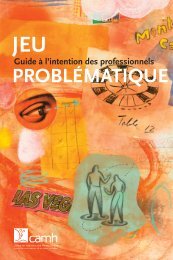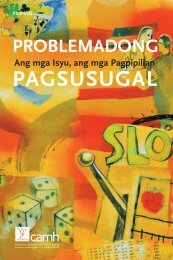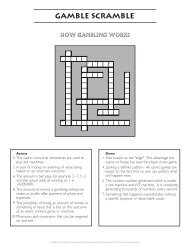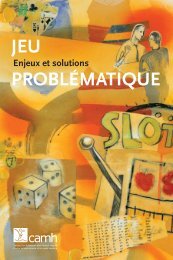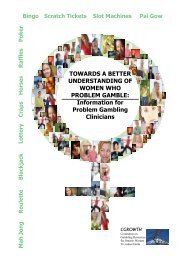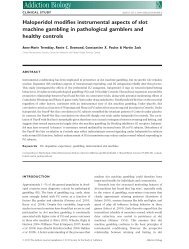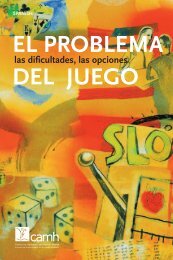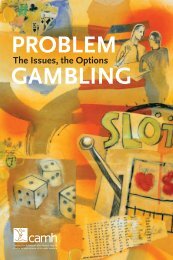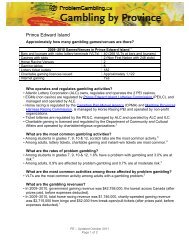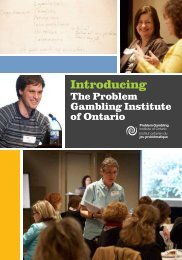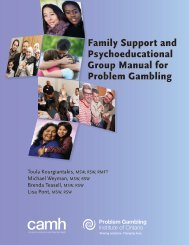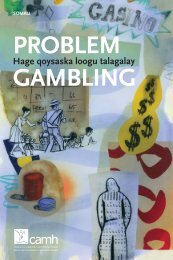Youth Making Choices: Gambling Prevention Program
Youth Making Choices: Gambling Prevention Program
Youth Making Choices: Gambling Prevention Program
Create successful ePaper yourself
Turn your PDF publications into a flip-book with our unique Google optimized e-Paper software.
Unit 7: Reducing RiskAppendix AStudent Resource 3 p. 3F. Societal Expectations for Academics and WorkEducation and school work and day-to-day professional communication in the 21st centuryrequire that we use computers. Those looking for jobs and careers are often expected to havesome basic-to-advanced cyber skills. Thus the majority of youth will be exposed to the internetand its interactive wonders. The key is asking what, as parents, community, society and soon, we should be doing to help educate our youth (as well as everyone else) on the potentialdevelopment of problems using this technology, as well as on methods for using it in as safe away as possible.G. Sedentary LifestyleAddictive behaviours may be linked. For example, many people attribute the increase in obesityin North American youth to fast foods and low physical activity; it is unclear, however, if there isnot a link to the over-use of technology. Many of you may have heard of people who would rathersend an e-mail to a person 15 feet away than get up and go talk with that person. Sedentarypeople see images of “beautiful” people on the Internet, video games and TV, and this can leadthem to be concerned about their appearance, which can then impact self-esteem. People withlow self-esteem may feel more comfortable interacting with people online versus in person,which can lead to exposure to online sexual activities such as interactive pornography sites.Also, some parents may feel it is “safer” for their kids to be gambling in the family room with theirfriends rather then for them to be out of the house, where the parents don’t know where they areor whom they are with.H. Feelings of MasteryPeople play video games and gamble for many reasons. For some adults and youth, they feel asense of being able to “master” the skills it takes to win. That sense of mastery of online gamesbecomes important because often there may be a lack of a sense of mastery in life offline. Forexample, if someone suffers from social anxiety, is being bullied or has physical ailments or atraumatic past, the anticipation of a win—not just with gambling but with video gaming too—canbe quite powerful. Killing the 27th level Orc Mage in the Dungeon can be very exciting, andan actual win can create a feeling of euphoria. It can make a youth (and adult) feel important,successful, skilled and happy. When one loses, however, these feelings can be replaced byanxiety, sadness, desperation, frustration and anger. Because of these emotional ups anddowns, people then feel drawn to play repeatedly. Both sets of positive and negative emotionalresponses can lead to what is called in psychology “intermittent reinforcement.” This form ofreinforcement is one of the strongest psychological aspects of developing problematic patternsof behaviour in these activities.Context Is KeyIt is important to not focus only on the problematic surface behaviour a youth engages in: one must alsolook at the big picture. For example, is the person someone with chronic pain who is more prone to stayat home? Is he or she depressed? Is he or she avoiding social situations? Understanding the biological,psychological, social, cultural and spiritual context of human behaviour is key to understanding what isactually going on in that person’s life, and ultimately understanding what can help the person get better.<strong>Youth</strong> <strong>Making</strong> <strong>Choices</strong>: <strong>Gambling</strong> <strong>Prevention</strong> <strong>Program</strong>www.Problem<strong>Gambling</strong>.ca7.12



